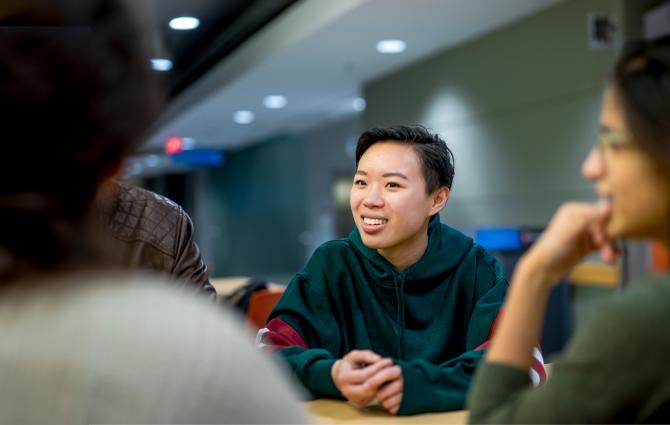Global change starts with one idea, one discussion. Who knows where it may lead?
The Global Lounge is hosting UBC’s 2nd World’s Challenge Challenge! Tackle a global issue and your team could win $6000.
With applications for the competition now open, I sat down with two of the finalists to learn more about the event—and to get their insights on how you can participate in this year's challenge.
First off, what is the World’s Challenge Challenge?
Yes, it’s not a typo—the World’s Challenge Challenge is an exciting way for students to engage in discussion and debate about world issues, and an opportunity to give your ideas a platform.
In a team of 3, you propose a unique solution to a global problem before a panel of judges. Your team has a chance to win $6,000 and the winner will move on to compete in the International World’s Challenge Challenge at Western University.
Insights from last year's finalists
Amit Chandna's team was one of ten finalists from last year. His team tackled the problem of world hunger by proposing the solution of a solar-powered crop irrigation system—a pumping system that waters crops with recycled excess runoff water collected during the wet seasons.

Another finalist, Michael Leff and his team addressed the overlapping issues of gender inequality, sexual violence against women, and subsequent barriers to good health in the context of refugee camps. In response to unsafe and unsanitary restrooms in refugee camps, their team presented the solution of gender-segregated restrooms along with an education plan that introduces concepts of health and sanitation within the camps.

But don’t hear it from me, read on to see what Amit and Michael have to share about their World's Challenge Challenge experience:
What inspired you to join the World’s Challenge Challenge?
Amit:
“I’d heard about it through working at the UBC Global Lounge, and initially I wasn’t thinking of joining, but it kept coming up so I thought I’d at least give it a good thought. I chose the problem of world hunger because of my background in Land and Food Systems and because I think it’s something we have the capacity to fix. If I couldn’t eat three times a day, I know I wouldn’t be in the shoes I am today. So maybe there’s a person who has an answer to a global issue but doesn’t have access to food or water. We need to tackle this basic need for food before we can even start thinking about other global issues.”
Michael:
“I wanted to tackle the Syrian refugee crisis and gender rights from a blend of different angles. Plus, the unique mandate for our student-led seminar course was to figure out a way to disseminate information on a current crisis—and this challenge was an opportunity to do that.”
How did you tackle the challenge?
Michael:
“The global nature of this challenge allows you to have more creative freedom to tackle it—remember, you’re not solving a global problem entirely, you’re working towards it. You’re given the opportunity to play the whole game: you get to create the question and how to answer it—the challenge acts as your platform.”
Amit:
“For the problems I couldn’t answer, I looked up the professors who specialized in that area and sat down with them, pitched our problem, and then gathered their insight. Plus, every person on our team came from a different background and brought a different set of valuable skills.”
What was the most rewarding or inspiring part of this experience for you?
Amit:
“This might not happen to you but for me, this experience helped me figure out what I wanted to do with my life. It laid out the next steps I wanted to take, like grad school, and realizing I wanted to work in agricultural development for the rest of my life. It was incredibly rewarding to see how an idea cultivated into something larger and to see its impact on a larger and tangible scale."
Michael:
“This quote from Colette, a refugee in Greece, sums up the issue: ‘It’s filthy here. The toilets are so dirty and we have no privacy so you have to shower with men watching you. We are afraid of being taken by men when we go to the toilet.’ This was a way to add my critical lens on the issue and talk about gender rights in a different context—how we can start the conversation."
What advice do you have for students interested in participating this year?
Amit:
“Do your research. Thorough research. But also remember to take a breather. It can be overwhelming, but don’t let it weigh you down. Like the allegory of the glass of water—it’s not the weight of the glass that will exhaust you, it’s how long you hold onto it. Remember to forget your stresses, walk away from the issue, and return to it with a fresh mind and outlook.”
Michael:
“There are tons of problems out there, but there are also tons of great initiatives trying to address them. We’re working towards solutions whether it be in a small or big way and this is how we can be a part of it. The idea that we put out there, sure, hasn’t been fully formulated yet but it’s a way to start.”
Get involved
If this is an opportunity you’d be interested in, check out more information on the World’s Challenge Challenge, and submit your application before December 3rd!
“It is going to take more than one university, more than one specialty, to solve the grand challenges of the world....We have to collaborate for a better world.” - Professor Santa Ono




